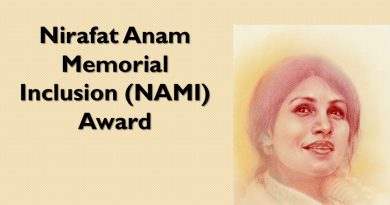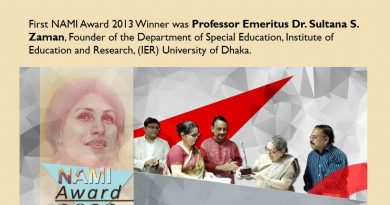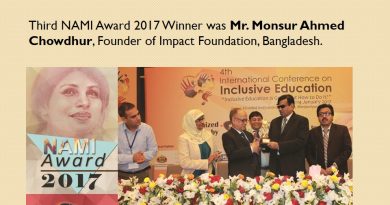Nami Award 2
2nd NAMI Award 2015
This is an honour for us to present the 2nd NAMI Award 2015 to a great personality, Social worker “Ms. Valerie Ann Taylor” who is the Founder & Coordinator of CRP her contributions for the inclusion of people with special needs in Bangladesh.
About Valerie Ann Taylor: Founder & Coordinator of CRP
Valerie Ann Taylor was born on the 8th February 1944, in Bromley, Kent, UK to parents Marie and William Taylor. Valerie is a Fellow of the Chartered Society of Physiotherapy (FCSP) and first came to Bangladesh with Voluntary Service Overseas (VSO) in 1969 to work as a physiotherapist in the Christian Hospital, Chandraghona in the Chittagong Hill Tracts. At that time Bangladesh was still known as East Pakistan. Her stay was interrupted by the War of Independence in 1971. During the war Valerie was evacuated but returned to the country in October 1971, two months before the creation of Bangladesh. Having grown up living close to the National Spinal Injuries Centre at Stoke Mandeville in England, she was very aware of the need for rehabilitation services for the disabled in Bangladesh.
In 1973 Valerie returned to England to attempt to raise funds to establish a rehabilitation centre for paralysed people. She stayed in England for two years before returning in 1975. It took another four years before CRP was able to admit its first patients in 1979. During this time, Valerie worked in the Shaheed Suhrawardy Hospital in Dhaka and it was in the grounds of this hospital that CRP had its first premises, two cement store rooms which were used to treat the first spinally injured patients. Rather like gypsies, having moved to three locations during the first eleven years, CRP then found a permanent home and moved to Savar in mid-1990 where the head office is situated. Valerie’s achievements have been recognized with various accolades. She received the OBE (Order of the British Empire) in 1995 from Her Majesty Queen Elizabeth; the Bangladesh Independence Award in 2004; Honorary Doctorate Degree (2010), by York St John University, UK and The ONE Award 2013 by Rotary International. In 1998 Valerie was granted Bangladeshi citizenship by the Government of Bangladesh.
Valerie has been legal guardian to two Bangladeshi girls for several years. She continues to live adjacent to the CRP-Savar premises with her younger adopted daughter, Poppy while Joyti, the eldest, who works as a computer operator in the CRP office, lives next door.
About Centre for the Rehabilitation of the Paralysed (CRP)
Founded in 1979 in response to the desperate need for services for spinal injured patients, the Centre for the Rehabilitation of the Paralysed (CRP) has developed into an internationally respected organization. In 2014 on 11 December CRP celebrated its 35th anniversary. CRP focuses on a holistic approach to rehabilitation, recognizing that all aspects of the rehabilitation process are vital for its success:
- Physical rehabilitation: through medical and therapeutic interventions and the provision of appropriate mobility aids
- Psychological rehabilitation: through counseling and sharing of experiences
- Economic rehabilitation: through vocational re-training and assistance in securing employment, sometimes with micro-credit loans
- Planned discharge: for a successful reintegration into the community, ensuring that the home environment is as safe and accessible as possible and that local residents are educated about disability, its causes and consequences
The holistic nature of CRP’s work is reflected in the fact that its work covers several areas of development including human rights, poverty alleviation, health care provision and education.
CRP’s headquarters are in Savar with an additional three functioning sub-centres throughout Bangladesh. CRP-Gonokbari is a residential vocational re-training centre for disabled women and girls; CRP-Gobindapur is a centre for community based services in Moulvi Bazar District and CRP-Mirpur is a thirteen-storey centre in Dhaka which provides medical, therapy and diagnostic services particularly catering to the Dhaka city inhabitants. In addition, CRP-Mirpur has several floors available for rent in order to defray the running costs of CRP-Savar. Four divisional centres in Rajshahi, Chittagong, Moulvi Bazar and Barisal are all in various stages of development.
Along with working to provide rehabilitation services for disabled people, CRP’s academic institute, the Bangladesh Health Professions Institute (BHPI), has pioneered the training of relevant health professionals in Bangladesh. Courses are run up to B.Sc. Degree level affiliated to Dhaka University and Diploma courses under the Bangladesh State Medical Faculty. BHPI is a national resource of Bangladesh, without which the quality of health services throughout the country and the future of vital health professions would be seriously compromised.
CRP has operated a special needs school at its Savar headquarters since 1993. This school combines CRP’s special needs students and students from the locality. By mixing and interacting with disabled children at an early age many of the barriers and superstitions surrounding disability will be broken down, leading to a more tolerant and understanding society. An inclusive educational environment also enables children with special needs to access a level of education suitable for their capabilities and to have the same access to sporting, recreational and extra-curricular activities as those attending mainstream schools.
Community Based Rehabilitation (CBR) projects operate in 13 districts of the country. Accident and disability prevention programmes include research components and aim to educate vulnerable groups on safe working and living practices. Advocacy and networking activities bring CRP’s work to the attention of relevant officials and promote improved co-ordination among the organizations with which CRP works. Awareness raising and publicity campaigns inform the population of relevant issues and attempt to break down the barriers, superstitions and stigmas which prevent disabled people from enjoying equal rights and opportunities.
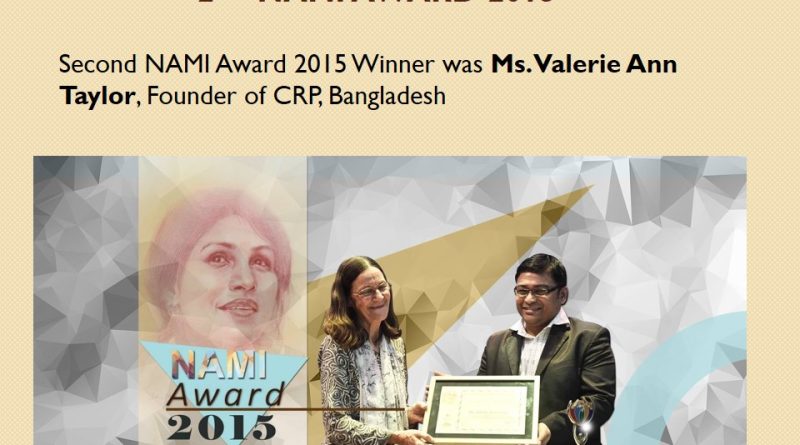

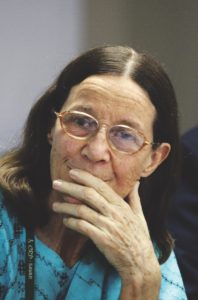 Valerie Ann Taylor was born on the 8th February 1944, in Bromley, Kent, UK to parents Marie and William Taylor. Valerie is a Fellow of the Chartered Society of Physiotherapy (FCSP) and first came to Bangladesh with Voluntary Service Overseas (VSO) in 1969 to work as a physiotherapist in the Christian Hospital, Chandraghona in the Chittagong Hill Tracts. At that time Bangladesh was still known as East Pakistan. Her stay was interrupted by the War of Independence in 1971. During the war Valerie was evacuated but returned to the country in October 1971, two months before the creation of Bangladesh. Having grown up living close to the National Spinal Injuries Centre at Stoke Mandeville in England, she was very aware of the need for rehabilitation services for the disabled in Bangladesh.
Valerie Ann Taylor was born on the 8th February 1944, in Bromley, Kent, UK to parents Marie and William Taylor. Valerie is a Fellow of the Chartered Society of Physiotherapy (FCSP) and first came to Bangladesh with Voluntary Service Overseas (VSO) in 1969 to work as a physiotherapist in the Christian Hospital, Chandraghona in the Chittagong Hill Tracts. At that time Bangladesh was still known as East Pakistan. Her stay was interrupted by the War of Independence in 1971. During the war Valerie was evacuated but returned to the country in October 1971, two months before the creation of Bangladesh. Having grown up living close to the National Spinal Injuries Centre at Stoke Mandeville in England, she was very aware of the need for rehabilitation services for the disabled in Bangladesh.